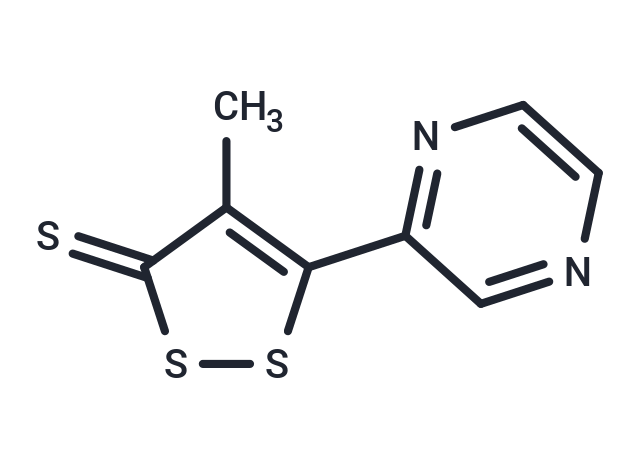 Your shopping cart is currently empty
Your shopping cart is currently empty

Oltipraz (RP 35972) is a synthetic dithiolethione with potential chemopreventive and anti-angiogenic properties. Oltipraz induces phase II detoxification enzymes, such as glutathione S transferase (GST) and NAD(P)H: quinone oxidoreductase 1 (NQO1). The induction of detoxification enzymes enhances the detoxification of certain cancer-causing agents, thereby enhancing their elimination and preventing carcinogen-induced DNA damages. Although the exact mechanism through which the anti-angiogenesis effect remains to be fully elucidated, oltipraz maybe able to modulate the expression of a number of angiogenic factors, thereby blocking the sustained and focal neovascularization in multiple tumor cell types.

| Pack Size | Price | USA Warehouse | Global Warehouse | Quantity |
|---|---|---|---|---|
| 5 mg | $31 | In Stock | In Stock | |
| 10 mg | $50 | In Stock | In Stock | |
| 25 mg | $71 | In Stock | In Stock | |
| 50 mg | $89 | In Stock | In Stock | |
| 100 mg | $126 | In Stock | In Stock | |
| 200 mg | $161 | In Stock | In Stock | |
| 1 mL x 10 mM (in DMSO) | $50 | In Stock | In Stock |
| Description | Oltipraz (RP 35972) is a synthetic dithiolethione with potential chemopreventive and anti-angiogenic properties. Oltipraz induces phase II detoxification enzymes, such as glutathione S transferase (GST) and NAD(P)H: quinone oxidoreductase 1 (NQO1). The induction of detoxification enzymes enhances the detoxification of certain cancer-causing agents, thereby enhancing their elimination and preventing carcinogen-induced DNA damages. Although the exact mechanism through which the anti-angiogenesis effect remains to be fully elucidated, oltipraz maybe able to modulate the expression of a number of angiogenic factors, thereby blocking the sustained and focal neovascularization in multiple tumor cell types. |
| Targets&IC50 | HIF1α:10 μM |
| In vitro | Oltipraz, as a chemoprotective agent, induces Phase II detoxification enzyme activity in a Nrf2-dependent manner. [1] In human HT29 colon cancer cells, oltipraz inhibits the induction of HIF-1α by insulin, hypoxia or CoCl2 by significantly accelerating degradation of HIF-1α protein. [2] |
| In vivo | Oltipraz (500 mg/kg, p.o.) significantly reduces multiplicity of gastric neoplasia in wild-type mice by 55%, but has no effect on tumor burden in nrf2-deficient mice. [1] In BALB/c nude mice transplanted with HCT116 cells, Oltipraz (200 mg/kg, p.o.) inhibits tumor growth and angiogenesis via inhibition of HIF-1α. [2] In rats on a CDAA diet, Oltipraz attenuate the progression of nonalcoholic steatohepatitis-related fibrosis. [3] |
| Kinase Assay | The Src and Abl kinase assays: The Src kinase activity is measured in an ELISA format. Src (3 units/reaction), reaction buffer (50 mM Tris-HCl pH 7.5, 10 mM MgCl2, 0.1 mM EGTA, 0.5 mM Na3VO4) and cdc2 substrate peptide are added to various concentration of Bosutinib and incubated at 30 °C for 10 minutes. The reaction is started by the addition of ATP to a final concentration of 100 μM, incubated at 30 °C for 1 hour and stopped by addition of EDTA. Instructions from the manufacturer are followed for subsequent steps. The Abl kinase assay is performed in a DELFIA solid phase europium-based detection assay format. Biotinylated peptide (2 μM) is bound to streptavidin-coated microtitration plates for 1.5 hours in 1 mg/mL ovalbumin in PBS. The plates are washed for 1 hour with PBS/0.1% Tween 80, followed by a PBS wash. The kinase reaction is incubated for 1 hour at 30°C. Abl kinase (10 units) is mixed with 50 mM Tris-HCl (pH 7.5), 10 mM MgCl2, 80 μM EGTA, 100 μM ATP, 0.5 mM Na3VO4, 1% DMSO, 1 mM HEPES (pH 7.0), 200 μg/mL ovalbumin and various concentration of Bosutinib. The reaction is stopped with EDTA at a final concentration of 50 mM. The reaction is monitored with Eu-labeled phosphotyrosine antibody and DELFIA enhancement solution. |
| Synonyms | RP 35972, NSC 347901 |
| Molecular Weight | 226.34 |
| Formula | C8H6N2S3 |
| Cas No. | 64224-21-1 |
| Smiles | CC1=C(SSC1=S)C1=NC=CN=C1 |
| Relative Density. | 1.51 g/cm3 |
| Storage | Powder: -20°C for 3 years | In solvent: -80°C for 1 year | Shipping with blue ice/Shipping at ambient temperature. | ||||||||||||||||||||||||||||||
| Solubility Information | DMSO: 15.29 mg/mL (67.55 mM), Sonication is recommended. | ||||||||||||||||||||||||||||||
| In Vivo Formulation | 10% DMSO+40% PEG300+5% Tween 80+45% Saline: 1 mg/mL (4.42 mM), Sonication is recommended. Please add the solvents sequentially, clarifying the solution as much as possible before adding the next one. Dissolve by heating and/or sonication if necessary. Working solution is recommended to be prepared and used immediately. The formulation provided above is for reference purposes only. In vivo formulations may vary and should be modified based on specific experimental conditions. | ||||||||||||||||||||||||||||||
Solution Preparation Table | |||||||||||||||||||||||||||||||
DMSO
| |||||||||||||||||||||||||||||||
| Size | Quantity | Unit Price | Amount | Operation |
|---|

Copyright © 2015-2025 TargetMol Chemicals Inc. All Rights Reserved.